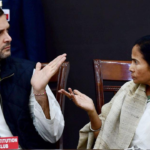India, on January 22, witnessed an amalgamation of joy and sadness as it celebrated the historic consecration of the Ram Mandir in Ayodhya alongside various events and observances. With Ram Temple festivities sweeping across India as a symbol of a ‘brighter future’ for many politicians, a number of activities took place prior to the temple’s opening
Hyderabad Incident: Freedom of expression vandalized
In a disturbing incident on January 21, a screening of Anand Patwardhan’s award-winning documentary, “Ram ke Naam,” faced disruption by Hindutva groups at Marley’s Joint Bistro in Hyderabad. Rather than addressing the disruptors, the police arrested four individuals, including the cafe owners and members of Hyderabad Cinephiles, charging them under various sections of the Indian Penal Code.
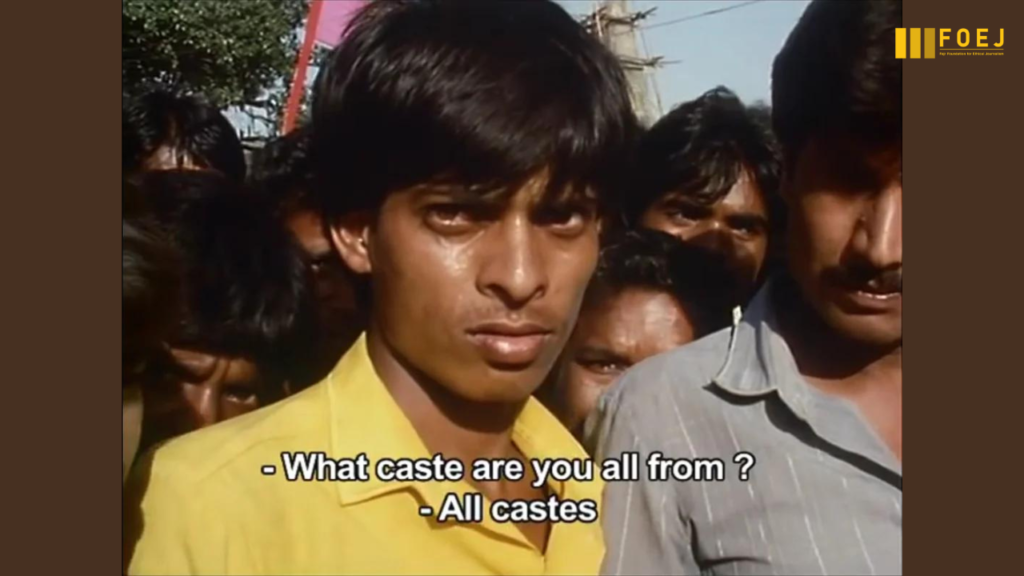
Patwardhan’s documentary, tracing the Ram Janmabhoomi movement and the Babri Masjid’s demolition in 1992, remains relevant, especially with the recent inauguration of the Ram temple in Ayodhya on January 22. Hyderabad Cinephiles condemned both the police and the state Congress government for their actions in a detailed statement.
The disruption involved around 10 people entering the venue, accusing the organisers of illegal screening and causing chaos. Despite efforts to explain the film’s legality, the police took action against the organisers and participants instead of the disruptors. The arrested individuals face charges including unlawful assembly, public nuisance, and outraging religious feelings.
The incident raises concerns about the curbing of freedom of expression and attacks on democratic rights. The statement by Hyderabad Cinephiles criticises the police’s unconstitutional actions, highlighting the contradiction between Congress’s claims of secularism and their failure to protect citizens’ rights.
In a related incident, a video showing Hindutva people sitting in front of Jama Masjid Betma reciting Hanuman Chalisa has circulated on social media. During Isha prayers, the religious procession was stopped in front of the mosque, and Hanuman Chalisa was recited while sitting in an attempt to incite the Muslims, although no violence erupted.
Madhya Pradesh Incident: Saffron flags hoisted on Christian prayer hall
In a related incident, Hindutva activists reportedly climbed on top of Christian prayer halls in Madhya Pradesh’s Jhabua district, hoisting saffron flags while chanting religious slogans. Videos of the incident went viral on social media, prompting Congress leader Digvijaya Singh to share visuals on Twitter.
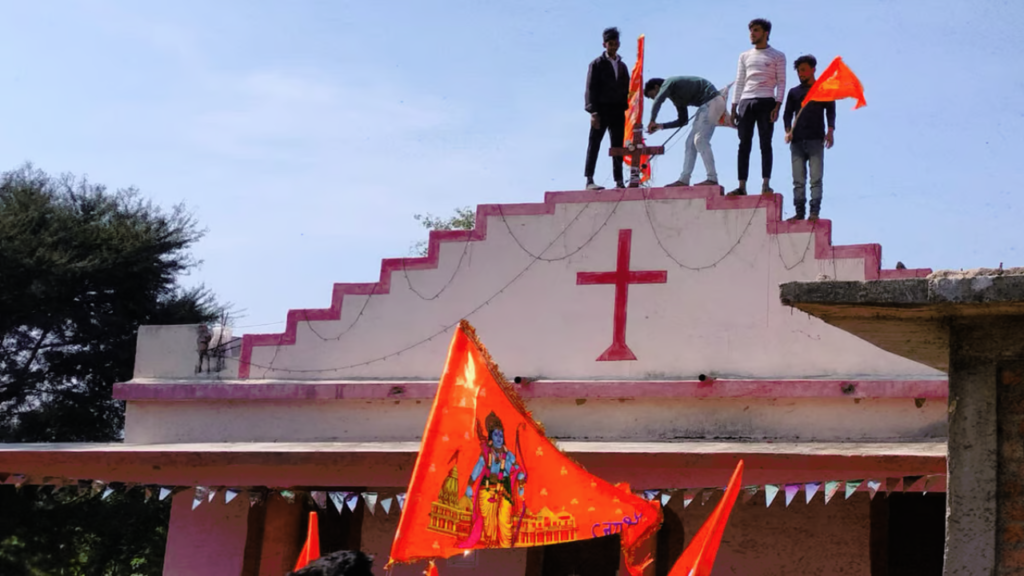
The mob targeted prayer halls managed by the Protestant Shalom Church and the Church of South India. Despite the police taking down the flags, allegations arose that they discouraged filing complaints, citing pressure from higher authorities. The incident reflects the growing influence of Hindutva outfits, especially among tribal youths in the area.
Pastor Godwin of CSI told the Newslaundry that the church is considering whether a complaint has to be filed. He said, “A crowd started their rally on motorcycles from a local market in Ranapur block and ended with hoisting saffron flags. It all seemed pre-planned. They were also carrying lathis. The crowd swelled as they moved from one prayer hall to another, starting with about 60 people at the time of the first flag hoisting and increasing to over 200 people in the last one.
Pastor Muniya, representing Shalom Church, emphasised the need to teach those responsible a lesson. Jhabua, with an 87 percent Scheduled Tribe population, witnessed this incident for the first time, fuelled by the recent Ayodhya events. The Supreme Court’s directive on registering FIRs for hate speech incidents without waiting for complaints underscores the need for immediate action.
As the nation grapples with these incidents, questions arise about safeguarding democratic values, secularism, and the freedom of expression promised by the Constitution.
The Mira Road Incident: Demands over the chants ‘Jai Shri Ram’
In a disturbing turn of events, clashes between two religious communities on Mira Road near Mumbai resulted in the arrest of 13 individuals. Following the arrests, the district administration, citing ‘illegal encroachments,’ initiated the demolition of multiple buildings and shanties on Tuesday, January 23.
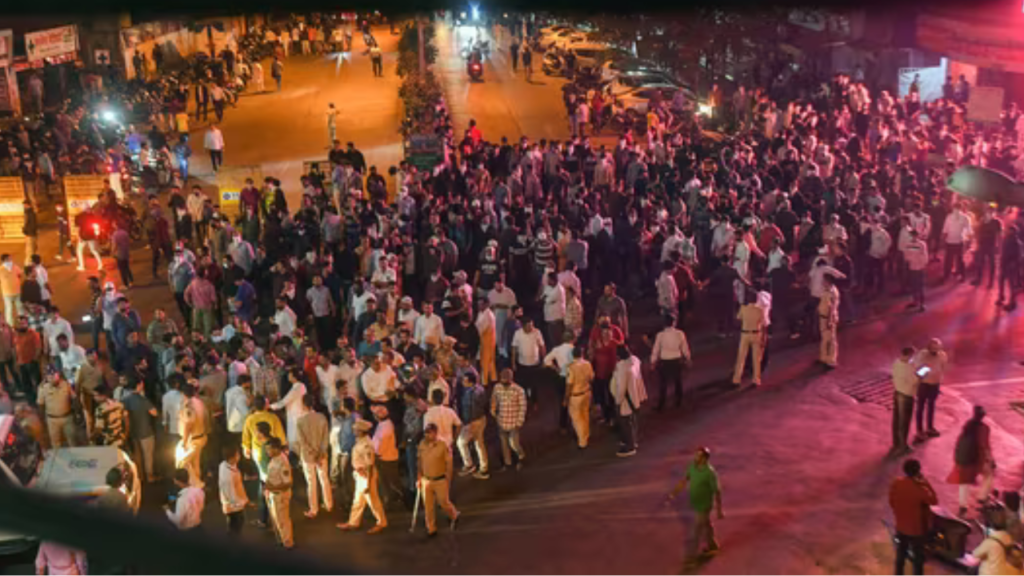
Bulldozers, accompanied by a substantial police and security presence, were deployed to the area. Fifteen illegal structures were demolished to curb potential tensions. Videos capturing the demolition quickly went viral on social media platforms.
The conflict began on January 21, a day before the scheduled inauguration of the Ram temple. Communal clashes erupted after Hindu men allegedly harassed a Muslim woman. Tensions escalated when a Hindutva mob forcibly stopped a Muslim man’s vehicle, demanding he chant ‘Jai Shri Ram.’ Despite complying, the mob seized the vehicle’s key and left.
Deputy Commissioner of Police Jayant Bajbale stated that the conflict originated when Hindutva community members raised ‘Jai Shri Ram’ slogans in a Muslim-dominated area. Immediate action was taken by the police, leading to the arrest of five individuals, and a case has been registered.
In response to the clashes, police arrested an individual seen provoking people in a viral social media video. The suspect, identified as Abu Shaikh, was taken into custody by Mira Bhayander police.
Bihar Incident: Firecracker ignited within a Muslim graveyard
In Khirma village, Bihar’s Darbhanga district, a procession commemorating a ceremony reportedly ignited a firecracker within a Muslim graveyard. This led to a swift spread of fire across the graveyard. Rani Kumari, the SHO of Keoti police station, stated that a Shobha Yatra passing by the graveyard was involved, and an FIR has been filed, naming 12 individuals and 50-100 unknown persons. No arrests have been made at this point.
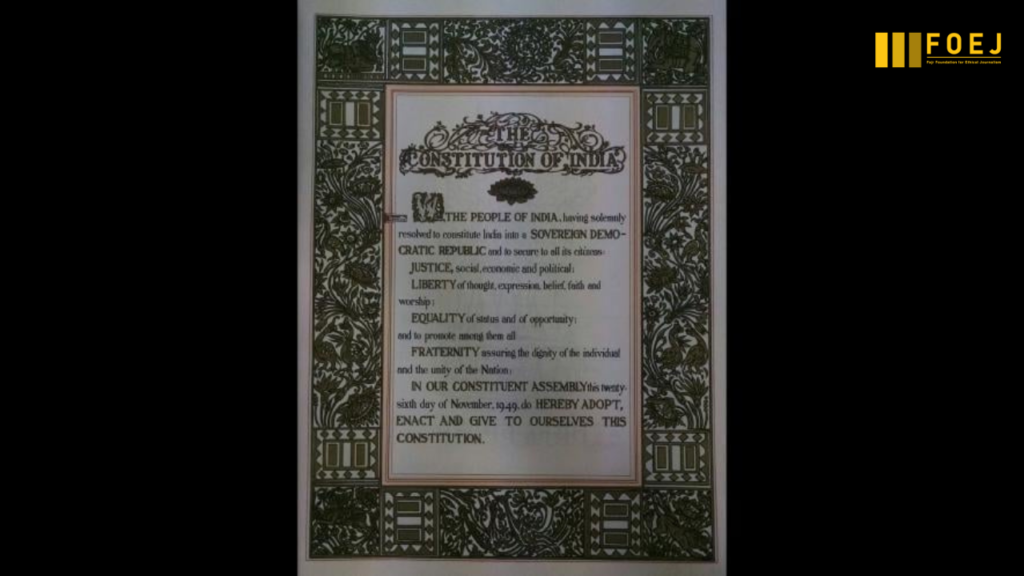
As such incidents take over the country, questions of democratic values, secularism and the freedom of expression go along hand. A silent rebellion unfolds as images of the Constitution’s Preamble flood social media—a visual protest preserving the heartbeat of democratic ideals in the digital realm.
The Mira Road Incident: Harassment, Conflict, ‘provoking video’ and Arrests#MiraRoadriot | #MiraRoad | #Mumbai pic.twitter.com/XfzFLBc5Zo
— FOEJ Media (@FoejMedia) January 23, 2024








